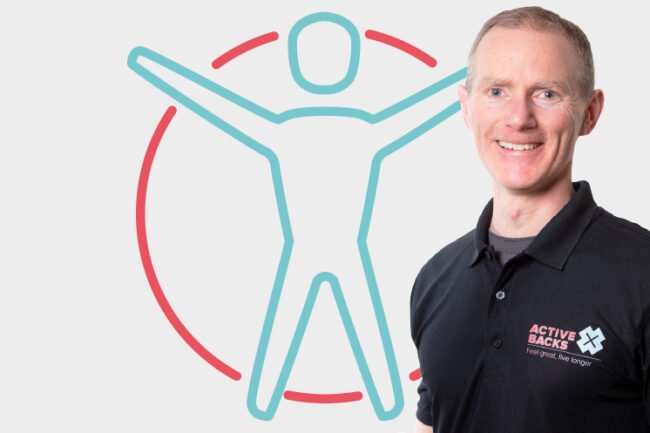How to sit with lower back pain / sciatica
How to sit with lower back pain / sciatica
Today’s episode is entitled “How to sit with lower back pain / sciatica” and the main points covered are:
- Variety and breaks: how to sit with lower back pain / sciatica
- Perching and wobbling
- How to sit with lower back pain / sciatica: supported-slump

Variety and breaks: how to sit with lower back pain / sciatica
One of the things that your back sciatica will struggle with is sustained load. If you stay in a position for a long time, your tissues will fatigue and cause you more pain. Avoid that by sitting in one position for 10 minutes and then in a different one for 10 minutes. It could be taking a break and getting up and moving around. Variety is important. Don’t stay in one position all of the time, or you will pay a price for that sustained loading. It will be cumulative because you will do it day after day for sustained long periods. Variety’s the spice of life. Your best posture is your next posture. If you spend all your time in one position, it will come at a price for your lower back pain / sciatica.
The importance of breaks. Don’t stay sitting down for very long. Your metabolic rate drops almost to the level of lying down. It’s very important to take breaks, get up, move around. Don’t just stand up, get up and move. Walk away, even if it’s only for a minute, go up and down the stairs a couple of times. Get your back moving. Motion is lotion.
Perching and wobbling
If your lower back pain / sciatica feels worse sitting, then perching -or active sitting- is the answer for you. That means sitting up with your hips higher than your knees. Sitting actively, not back into the chair, but actually perching, holding yourself up as though you were sitting on a stool. Combine this with a wobble cushion on your chair. You sit on it and it encourages you to move while you’re sitting, wobbling from side to side. It also encourages you to sit and hold yourself up tall. Maintain the arch and the small of your back. Preserve the arch when you sit down. Sit higher than the 90 degree angles at the hips, such that there is 130 degree angle, with your knees lower than your hips. Sit there and wobble from cheek to cheek. That simulates the act of walking. When you wobble your hips, move up and down on your lower back and bend side to side. Most backs prefer movement to static posture. Wobble as you work.
How to sit with lower back pain / sciatica: supported slump
Sit with your bottom right to the back of the chair and lean back so that your trunk is being supported by the chair back. This gives you a rest. So long as you have a support in the small of your back, slumping is fine. It’s not an ideal position for keyboarding, since you’ll have to reach forwards for the Mason keyboard. That will put an extra load -and maybe pain- on your shoulders, upper back, and neck and forearms. The supported slump is ideal for talking to colleagues, gazing at the ceiling, thinking about what you’re going to have for lunch, speaking, the telephone, these sorts of activities. I like to call it my creative thinking posture.


